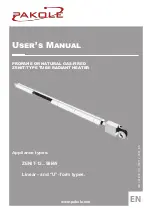
Frame and Equipment Supplied
The main parts of the appliance are:
• the casing, comprised of two parts, which integrate
the spigots provided for connection with the air inlet and
outlet ducts and contains the internal components and
heat exchanger in an air tight housing;
• the internal air ways, that distribute the air flow
maximizing the heat insulation and minimizing losses;
• the heat exchanger, made out of plastic resin and of
counter flow type, whose particular shape guarantees
the highest possible efficiency in terms of heat
exchange up to 95%;
• the two motors, of the brushless three phase variety,
mounted on anti-vibration supports, that drive the
impellers;
• the stepping motor, that controls the by-pass and
defrosting valves;
• the electronic control suite, that oversees the power
supply, the appliance commands and controls;
• the sensors (temperature, relative humidity and CO2),
on the basis of which the systems electronic controls
establishes automatically the appliance’s operating
mode.
• ATTENTION: to be truly “UK APPENDIX Q” eligible, the
cap supplied with the appliance should be inserted into
the de-frost protection valve inlet, as shown in fig.2.
Accessories Supplied
The appliance supplied accessories include:
• a condensation drain pipe;
• a pipette for the connection of the drain pipe;
• 2 filters with F5 level particle retention;
• A silencer, with a standard diameter of 150 mm and
0.5 m in length, to be placed downstream of the
product, on the room intake ducts;
• two metal brackets, on which to mount the apparatus
in a vertical position;
• a radiofrequency (RF) remote control for the initial set
up and subsequent operation of the appliance;
• four supports for horizontal installation of the
appliance.
Installation
The appliance must be installed according to the safety
regulations currently in force in the country of
installation, and the instructions provided by this
manual.
Prerequisites
The appliance must be installed on an internal surface or
wall of the home structurally suited to holding its weight
(at least 200 kg/m2).
The appliance must not be installed in areas where the
temperature may drop below 0°C.
The site chosen for installation must take into account
the position of the power supply cable (1.5.m long) and
the electrical connections that come out of the
underside of the appliance (Fig. 3).
The air distribution ducts must be of the correct size.
The ducts to and from the exterior must be thermally
insulated and not subject to vibrations. The inlet and
outlet ducts, of a standard diameter of 150 mm, must be
secured to the corresponding spigots of the appliance
by means of clips or other suitable fastening systems.
In order to optimize acoustic levels a silencer must be
mounted on the air feed into the home (fig.4).
3
3
2
2
24
ENGLISH
















































